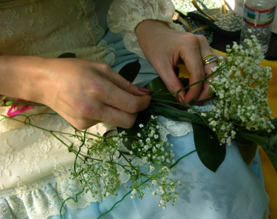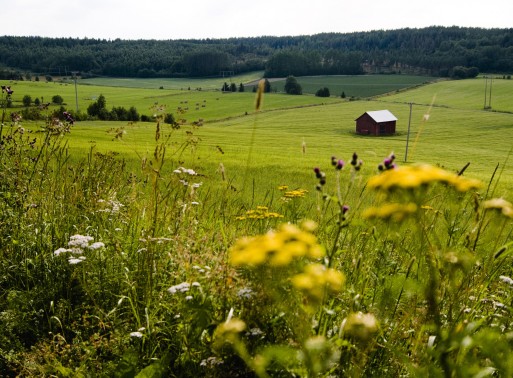
Not just for Midsummer: Swedish flowers, like Baby’s Breath, play an important role in funerals.
(Credit: thehairpin.com)
Though it’s filled with almost every kind of prominent world religion, Sweden also has a strong identity as a secularized country. This duality has thus influenced the way the Swedish government approaches the numerous funeral and burial practices in their country: each religious group is given its own compound for its own unique purposes. In Sweden, one can find Baptist, Muslim, Jewish and Buddhist citizens – but ever since the 16th century, its most prominent religion has been Christianity. And while their funeral ceremonies parallel those of Christians in the United States, they retain some personal, distinctive qualities that differ from the style in which many Christian Americans practice funeral traditions.
“…[Swedish] funeral ceremonies parallel those of Christians in the United States, [but] they retain some personal, distinctive qualities that differ from the style in which many Christian Americans practice funeral traditions.”
“What’s [so] special with [all] Swedish funerals,” says a Swedish blogger named Magdalena, “is that we wait between one to three weeks before the deceased is buried. We also have special sections where the dying person can be placed while waiting for death to come.” A Christian Swedish funeral ceremony is traditionally rather small, encouraging an air of intimacy as well as exclusivity.
This prevalence of immediate family-based services speaks to the Swedes’ reputation as a very private, sometimes guarded people. “The Lutheran church was not particularly fond of communal festivities and processions,” explains the country’s official website, “and Sweden’s scattered population in combination with the chilly climate meant that celebrations were moved indoors and became a family affair.”
Flowers also prevail as a key aspect of the service, with loved ones offering bouquets to the casket or “chest” of their loved one to reflect their sentiments. Finally, the close relatives will often sing songs during the funeral ceremony in a moment that becomes a cathartic expression of both love and grief.
About 95,000 people pass away in Sweden annually. The law “requires everyone to be buried,” according to Swedish culture website Allscandinavia.com, “[and] Swedish funeral services have a unique way to deal with the different wishes concerning the funeral customs and places of burial [for] people of different religions.” By law, the Parish churches must provide burial grounds for “those who don’t belong to the Swedish Church.” Catholics and Jews in Stockholm have their own respective cemeteries – but Muslims, for example, are buried “in special areas within the cemeteries of the Swedish Church.”
“This prevalence of immediate family-based services speaks to the Swedes’ reputation as private [and] sometimes guarded.”

The city of Stockholm’s model a new crematorium at the Woodland cemetery.
(Credit: e-architect.co.uk)
Yet, it’s only recently that burials have prevailed as the most popular end-of-life option for Swedes; prior to burials, cremation was the go-to option. “Young people in particular are talking a lot about earth burial,” says Ulf Lernéus, the head of the Swedish Association of Funeral Directors, “When we visit upper secondary schools the pupils are always surprised that cremation [was] more common. They think it seems scary.”
Whatever beliefs or religion we may (or may not) have, we’re all bound by the fact that we share the same, inevitable fate of dying. Sweden is a testament to the idea that a country, can address the end-of-life needs of all of its inhabitants — however diverse they may be.
Related:
- Read more about Swedish traditions on the country’s official website here
- SevenPonds’s article: “Swiss Pragmatism Extends into Death”
- SevenPonds’s article: “Wampanoag Burial Traditions”

 Funeral Practices in Sweden
Funeral Practices in Sweden




 First the Wealth Gap, Now the U.S. Has a Growing Health Gap
First the Wealth Gap, Now the U.S. Has a Growing Health Gap
 How to Comfort A Dying Loved One
How to Comfort A Dying Loved One
 Our Annual Seven Holiday Gifts for Someone Who Is Grieving, 2024 Edition
Our Annual Seven Holiday Gifts for Someone Who Is Grieving, 2024 Edition














